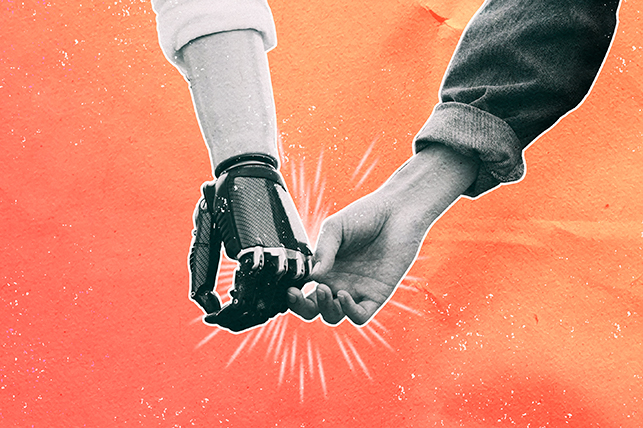How Being A Caregiver Can Change Your Intimate Relationships

Key Points
- Caregiving is a challenging responsibility that many individuals will take on at some point in their lives.
- It's important for caregivers to identify specific feelings causing fatigue and seek help for themselves.
- Caregiving for a life partner can significantly change the dynamics of the relationship.
Most of us will become a caretaker during one or more phases of our lives at some point. Whether a child, a parent, a sibling, a partner or someone else in our lives, we will likely have responsibility for another's well-being and safety eventually.
Sometimes the job is tasked suddenly and sometimes it comes on more slowly, such as with the decline of a parent.
According to a report conducted in 2020 by the National Alliance for Caregiving and AARP (American Association of Retired Persons) more than 1 in 5 Americans are caregivers, an estimated 53 million adults, up from 43.5 million caregivers in 2015. As the population gradually skews older, this number will rise.
In other reporting, it's been suggested caregivers have higher rates of depression, anxiety, stress and emotional difficulties. Caregivers often have lower self-ratings of physical health, elevated levels of stress hormones, higher rates of chronic disease and are less likely to prioritize their well being.
Caregiving—especially for the infirm—is definitely a marathon rather than a sprint. While juggling the numerous demands and responsibilities of ministering to another, caregivers must create boundaries to best preserve their well-being.
The job only becomes more complex if we find ourselves becoming the custodian for a partner.
Recommended
- How Does Overmedicalization Impact Disabled People?: Being medicalized is inescapable for some patients, but it should not poison sexual development.
- What Are the Challenges of Dating Someone In a Wheelchair?: A dating guide for newly disabled or starting to date someone using a mobility aid.
- Can I Get Acne On My Penis?: You may notice some strange bumps down there, but they can't be zits…right?
Caring for your partner
We enter intimate relationships as equals, but when one of a pair becomes ill or otherwise impaired, and the other becomes a caregiver, the relationship dynamic changes.
Earnings may be impacted. Workloads will shift. And often, for many reasons, our sex lives take a hit.
"Personal care can change feelings around intimacy for both the caregiver and the caree," said Denise Brown, founder of the Caregiving Years Training Academy in Park Ridge, Illinois. "Personal care takes away that feeling of romance with a partner."
Brown said discussing intimacy with your partner can be difficult but necessary. A tired and stressed caregiver may be less interested in sex or less attracted to a partner who is less physically able to participate in sex, whether due to sexual dysfunction, cognitive infirmity or physical incapacity.
Under these circumstances, partners interested in continuing intimacy may want to be more deliberate and willing to expand their definition of sex.
Couples should be intentional about their communication, said Madelyn Esposito, LPC, AASECT, a Madison, Wisconsin-based sex therapist who works with couples facing disability issues.
"It's about asking more questions versus assuming and working on trust with the other person," she said.
She said couples discuss a wide range of topics, such as what changes may need to occur based on physical ability, sexual function and so on, and changing concepts of intimacy.
"Maybe kissing, touching and cuddling becomes more pleasurable and less physically taxing than penetrative or oral sex," she said. "Maybe they can agree to have sex when both are rested and less stressed."
Compassion fatigue
In most instances, caregiving is a solo job—most often taken on by women. It can be overwhelming to juggle the finances, health care and physical needs of another in addition to trying to maintain a career, raise a family and maintain a personal relationship. No matter how hard you work, it never feels like enough.
"Compassion fatigue is an umbrella term for many feelings," Brown said. "I think we need to get specific about what people are feeling so we can develop specific strategies to deal with them. If we can name what is wearing us out, we can do something about it."
For instance, she said, a person may feel tired of "trying" because it seems as though trying isn't getting them anywhere.
"What they should be thinking is 'I'm going to take a break from trying," she said. "I've tried enough. Instead, I will focus on receiving by taking a walk, enjoying a cup of coffee or writing in my journal.'"
What Are the Challenges of Dating Someone In a Wheelchair?: Approximately 1.85 percent of people in the world use a wheelchair, but how often do you hear about sex or dating when you're in one? Here's a dating guide if you're newly disabled or starting to date someone using a mobility aid.
Find the help that really helps
Brown said she thinks of the family caregiver as having created a house of cards, maintaining a delicate balance between communication and the myriad tasks of caregiving and other life responsibilities.
"The house is so fragile, even good things like help can threaten it because you have to get buy-in from other people when you add help," she said. "You have to train someone. You have to manage them. So, adding help can sometimes be a lot of work."
One of the mistakes people make is focusing on getting help for the caree and overlooking trying to get help for themselves. For instance, hiring a cleaning service to come into the home a few times a year might be easier than hiring a homecare agency, which will need more supervision.
"We can decide what helps us in a way that could be unique and maybe not as exhausting as hiring, for instance, a homecare agency," Brown said. "I would also say that the more people who help us and—these are people who really do help us—the better it is for us because there are other people who understand the logistics, the nuances, the details of the caregiving situation."
She added that finding someone to help who understands what's needed will make it possible for the caregiver to take a few moment's respite because they're confident of their temporary replacement having the right experience in a crisis.
Know what you need
Sometimes even knowing where to begin with setting boundaries can feel overwhelming. Brown noted it's best to make a list of the things you cannot sacrifice in your life.
That might be having lunch with friends once a month, going to the gym several days a week or keeping your own medical appointments.
"Once you look at the time commitment for the things on the list, it may seem less overwhelming," she said.
The same goes for self-care.
"Self-care while caregiving looks very different than it is outside of caregiving," Brown said. "The rigors and responsibilities of caregiving take a toll on our bodies, and sometimes going to the gym just isn't something we have the energy to do."
Instead, taking a few minutes to watch a TV show may be all the time you get, but all the respite you need.
"It's OK to relax," Brown said. "I think what's often missing in our day is our own permission to relax, and that can be the most important thing of all."


















